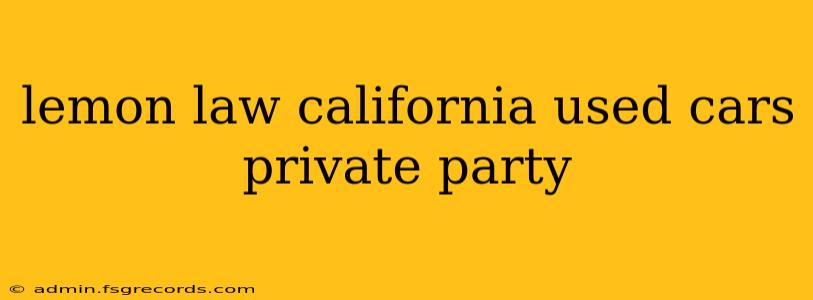Buying a used car can be a risky endeavor. While the thrill of finding a great deal is undeniable, the potential for hidden problems is a significant concern. In California, the Lemon Law offers some protection, but its application to private party used car sales is often misunderstood. This comprehensive guide clarifies the complexities of California's Lemon Law and its relevance to used car purchases from private sellers.
Does the California Lemon Law Apply to Used Cars from Private Parties?
The short answer is: generally, no. The California Lemon Law, formally known as the Song-Beverly Consumer Warranty Act, primarily protects consumers who purchase new cars or certified used cars from dealers. This is a crucial distinction. The law focuses on the manufacturer's warranty and the dealer's role in ensuring the vehicle's compliance with that warranty.
Private party sales fall outside the typical scope of the Lemon Law because:
- No Manufacturer Warranty Involvement: Private sellers aren't bound by the manufacturer's warranty obligations. They don't represent the manufacturer and aren't obligated to repair or replace a defective vehicle under the Lemon Law framework.
- Lack of Dealer Responsibility: The Lemon Law holds dealers accountable for resolving warranty issues. Since private parties aren't dealers, this aspect of the law doesn't apply.
What Rights Do You Have When Buying a Used Car from a Private Seller in California?
While the Lemon Law may not offer direct protection in private party sales, you still have legal recourse if the vehicle is significantly defective. Your options depend on the circumstances:
1. Breach of Contract or Misrepresentation:
If the seller made false claims about the car's condition – for example, misrepresenting its history, mileage, or the extent of repairs – you might have grounds for a civil lawsuit based on breach of contract or fraudulent misrepresentation. This requires demonstrating the seller knowingly made false statements that influenced your decision to buy the car. Gathering evidence like text messages, emails, or witness testimonies is vital in these cases.
2. Implied Warranties:
California law recognizes implied warranties in sales transactions. These are not explicit guarantees but are assumed unless explicitly disclaimed. These include:
- Implied Warranty of Merchantability: This implies the car is fit for its ordinary purpose (driving). A car with major mechanical defects that render it unsafe or unusable might violate this warranty.
- Implied Warranty of Fitness for a Particular Purpose: If the seller knew you intended to use the car for a specific purpose (e.g., towing) and it’s unfit for that purpose, you could have a claim.
To pursue these claims, you'll need to prove the car was defective at the time of sale and that the defect substantially impairs its value or use.
3. Consumer Legal Remedies Act:
The Consumer Legal Remedies Act (CLRA) offers broader protection than implied warranties. It prohibits unfair or deceptive business practices and allows you to sue for damages if a seller engages in such practices, even in a private sale.
Protecting Yourself When Buying a Used Car Privately in California:
- Thorough Inspection: Have a trusted mechanic conduct a pre-purchase inspection. This is crucial to identify any hidden problems before the sale.
- Documentation: Document everything. Keep records of communications, the purchase agreement, and the inspection report.
- As-Is Clauses: Be aware of "as-is" clauses in sale agreements. While they limit the seller's liability, they don't completely absolve them from responsibility for fraudulent misrepresentation.
- Know Your Rights: Understand your rights under California law, including the implied warranties and the CLRA.
- Legal Counsel: If you encounter significant problems, consult with a California attorney specializing in consumer law.
Conclusion:
While California's Lemon Law doesn't directly apply to used car purchases from private parties, buyers aren't without recourse. By understanding your rights under contract law, implied warranties, and the CLRA, and by taking proactive steps to protect yourself, you can navigate the used car market with greater confidence. Remember, thorough due diligence and proper documentation are your best defenses when buying a used car from a private seller in California.

